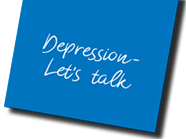Minding your own mental health
A diagnosis of depression may be a source of relief or worry, and supportive family and friends can play an important role in recovery. If your friend or family member is currently or repeatedly experiencing depression, it is important to look after your own wellbeing too. Caring for and supporting someone with depression can be challenging, so it is important to take steps to mind yourself too.
Even though supporting someone with depression might mean that you have less time for yourself, try to ensure that you do not give up all your usual activities and hobbies, as these are important for your own wellbeing and social life. Your GP can help to alleviate any concerns you have about your loved one, and to access supportive counselling of your own, if you think that might be helpful. Look out for local depression support groups as some of these include separate groups for relatives too. These groups can provide a safe space to discuss your concerns and access support of people in a similar situation.
It is sometimes the case that family members share certain risk factors or experiences, which explains the higher risk of depression among relatives of those with depression. After reading here about the signs and symptoms of depression, you may believe that you might also be suffering from depression. If so, you might like to take our self-test and talk it over with your GP. It may be that you meet the criteria of depression, even though your profile might be quite different from your friend or family member.



